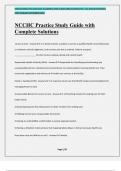EMILLYCHARLOTTE 2024/2025 ACADEMIC YAER ©2024 EMILLYCHARLOTTE®. ALL RIGHTS RESERVED
FIRST PUBLISH SEPTEMBER 2024
NCCHC Practice Study Guide with
Complete Solutions
Access to Care - Answer✔✔-In a timely manner, a patient is seen by a qualified health care professional,
is rendered a clinical judgement, and receives care that is ordered. Patients are given
___________________ for their serious medical, dental and mental health.
Responsible Health Authority (RHA) - Answer✔✔-Responsible for identifying and eliminating any
unreasonable barriers, intentional and unintentional, to inmate patients receiving health care. They
ensure the organization and delivery of all health care services at the facility.
Estelle v. Gamble (1976) - Answer✔✔-U.S. Supreme Court case that NCCHC makes recommendations for
managing Access to Care
Unreasonable Barriers for access to care - Answer✔✔-1) Punishing inmates for seeking care for their
health needs
2) Assessing excessive fees that prevent or deter inmates from seeking care
3) Holding sick call at an unreasonable time (2am)
4) Having an understaffed, underfunded, or poorly organized system
5) Having a utilization review process that inappropriately delays or denies necessary health care
How often must the RHA be on-site? - Answer✔✔-Weekly
Page 1/16
,EMILLYCHARLOTTE 2024/2025 ACADEMIC YAER ©2024 EMILLYCHARLOTTE®. ALL RIGHTS RESERVED
FIRST PUBLISH SEPTEMBER 2024
Responsible Physician - Answer✔✔-Final clinical judgments rest with a single, designated
_______________________. This individual is a MD or DO available to the facility frequently enough to
fulfill this position's clinical and administrative responsibilities.
Who can a RHA be? - Answer✔✔-Physician, health services administrator or agency
How often must the RHA be present if they are an agency? - Answer✔✔-Weekly - with a designated
individual at the local level to ensure policies are carried out
Health Care - Answer✔✔-The sum of all actions, preventative and therapeutic, taken for the physical and
mental well-being of a population. This includes medical, dental, mental health, nutrition, and other
ancillary services as well as maintaining clean and safe environmental conditions.
Designated Mental Health Clinician - Answer✔✔-A psychiatrist, psychologist, or psychiatric social worker
who is responsible for clinical mental health issues when mental health services at the facility are under
a different authority than medical services
Designated Dental Clinician - Answer✔✔-A DMD or DDS who is responsible for dental issues when dental
services at the facility are under a different authority than medical services
Health Services Administrator - Answer✔✔-A person who by education, experience or certification (e.g.
MSN, MPH, MHA, FACHE, CCHP) is capable of assuming responsibility for arranging all levels of health
care and ensuring quality and accessible health services for inmates
Qualified Health Care Professionals - Answer✔✔-Include physicians, physician assistants, nurses, nurse
practitioners, dentists, mental health professionals, and others who by virtue of their education,
credentials, and experience are permitted by law to evaluate and care for patients
Page 2/16
, EMILLYCHARLOTTE 2024/2025 ACADEMIC YAER ©2024 EMILLYCHARLOTTE®. ALL RIGHTS RESERVED
FIRST PUBLISH SEPTEMBER 2024
Custody Staff - Answer✔✔-Includes line security as well as correctional administration
Health Staff - Answer✔✔-Includes all full-time, part-time, and per diem qualified health care
professionals as well as administrative and support staff (e.g. health records administrators, laboratory
technicians, nursing and medical assistants, clerical workers)
Administrative Meetings - Answer✔✔-Held at least quarterly and are attended by correctional
administration, RHA and other health care team members as appropriate. Minutes are recorded and
made available for appropriate staff
Health Staff Meetings - Answer✔✔-Should occur MONTHLY (or more frequently) to address pertinent
health care issues. Minutes are recorded and made available for appropriate staff
Statistical Reports - Answer✔✔-Performed Monthly to monitor trends in the delivery of health care
Facility Staff - Answer✔✔-Custody and health staff members
Correctional Administrator - Answer✔✔-A person who oversees the daily operations of federal or state
prisons and county jails. They are responsible for managing the principles and practices of correction,
facilities planning and management, safety and security, social and health services, staff and inmate
management, budgeting, communications, correctional psychology, and applications to specific types of
correctional facilities.
How often should health care policies and procedures be reviewed? - Answer✔✔-At least annually by
the RHA and responsible physician with signatures documenting the interaction.
Policy - Answer✔✔-A facility's official position on an issue related to its operations
Procedure - Answer✔✔-Describes in detail, sometimes in sequence, how a policy is to be carried out
Page 3/16




